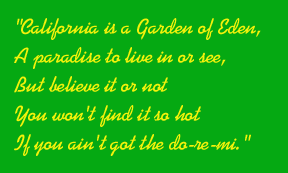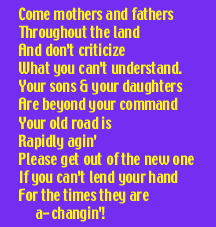























 uesdays
& Thursdays 2:00–3:50 p.m. uesdays
& Thursdays 2:00–3:50 p.m.Montgomery Hall 120 www.smcm.edu/users/rpfeingold |
| In this class we will expore a representative portion of the vast body of American literature set on and about “the road.” Travel and exploration—both the literal, physical journeys, as well as the inner quests which often accompany them—have always occupied a major role in the American imagination. In large part, this is an inevitable result of the relatively rapid and recent settlement of the land: the relentless westward progress of the frontier provided a fertile ground for national myth and narratives based on transit. Works such as Francis Parkman’s The Oregon Trail (1849) have long been acknowledged as central elements of our literary and historical heritage. Building on this tradition of the frontier—and also, especially in recent years, reacting against it—American authors have created a corpus of work, stunning in its diversity, which nonetheless is linked by this central idea of the open road. |
|
 |
| The class will begin by studying the myths and realities of the American frontier, both via classic nineteenth-century first-person accounts, and through later revisions of frontier imagery. We will then move on to works that explore the darker side of the road as a site of escape, exile, and dispossession—texts whose heroes and heroines are runaways, hobos, escaped slaves, or economic migrants. Finally, we will read texts that tap into the popular contemporary notion that outward journeys can be linked to inward discovery. Throughout the semester, we will focus on variations in the imaginary of the road as experienced by women, African Americans, and Native Americans. |
 |
 |
| Date | Readings | Special |
| Week 1 (16 & 18 January) |
for Thursday: selections from Francis Parkman, The Oregon Trail |
|
| Week 2 (23 & 25 January) |
for Tuesday: for Thursday: |
For other narratives of western migration, see the Library
of Congress’s “American Memory”
website—an invaluable, searchable collection of documents and photographs
on all sorts of subjects. In particular, look at the following collections,
all listed under the broad rubric of “History”: Thursday’s song: Conni |
| Week 3 (30 Jan & 1 Feb) |
Thursday: |
Movie screening Monday at 8 p.m in Library 321: Stagecoach (1939), dir. John Ford, 96 minutes Thursday’s song: Trevor |
| Week 4 (6 & 8 February) |
for Tuesday: The Bean Trees, by Barbara Kingsolver for Thursday: |
Tuesday’s song:
Rhian |
| Week 5 (13 & 15 February) |
for Tuesday: for Thursday: |
Movie screening Monday at 8 p.m in Library 321: Dead Man (1995), dir. Jim Jarmusch, 121 minutes Tuesday’s song: Maury Due Sunday 18 February by 10:00 p.m., via e-mail: paper on The Frontier. Especially if you haven’t written papers for me before, I encourage you to look at my on-line paper-writing instructions, cited somewhere on the Web as “painfully thorough.” They were designed for Intro to Lit students, so some of the stuff will probably seem pretty basic, but it’ll still give you an idea of what I look for. In particular, please note my instructions on anonymous submission—this applies to you. |
 |
 |
| Date | Readings | Special |
| Week 6 (20 & 22 February) |
Incidents in the Life of a Slave Girl, Written by Herself, by Harriet Jacobs
|
Tuesday’s song: Amy Thursday’s song: Kylee |
| Week 7 (27 Feb & 1 March) |
Start reading ahead in Steinbeck. Now! for Tuesday: for Thursday: |
Class meets Tuesday in Library 321: Tuesday’s song: Andy
|
| Week 8 (6 & 8 March) |
The Grapes of Wrath, by
John Steinbeck |
Movie screening Monday at 7:30 p.m in Library 321: The Grapes of Wrath(1940), dir. John Ford, 128 minutes Tuesday’s song: Eric |
| Week 9 (20 & 22 March) |
for Tuesday: Thursday: prepare to discuss My Own Private
Idaho |
Movie screening Monday at 8 p.m in Library 321: My Own Private Idaho (1991), dir. Gus Van Sant, 102 minutes Tuesday’s song: Meredith |
| Week 10 (27 & 29 March) |
No class Tuesday—Advising Day Thursday: |
Thursday’s song: Greg |
 |
 |
| Date | Readings | Special |
| Week 11 (3 & 5 April) |
for Tuesday: for Thursday: |
Due Saturday 7 April by 10:00 p.m., via e-mail: paper on Exiles & Outcasts. See the coolest car commercial ever Tuesday’s song: Zach |
| Week 12 (10 & 12 April) |
for Tuesday: for Thursday: |
Movie screening Monday at 8 p.m in Library 321: Two-Lane Blacktop(1971), dir. Monte Hellman, 102 minutes read the working
screenplay check out some unbelievably detailed fan sites on the film: Tuesday’s song: Erin Hardy |
| Week 13 (17 & 19 April) |
for Thursday:
|
Tuesday’s song: Erin Henry Thursday’s song: Mat |
| Week 14 (24 & 26 April) |
for Tuesday: for Thursday: |
Movie screening Monday at 8 p.m in Library 321, Wednesday at 8 p.m. in Library 306: Thelma & Louise (1991), dir. Ridley Scott, 129 minutes Due Thursday 3 May by 2:00 p.m., via e-mail: paper on Seekers. |
Final exam: Due (via e-mail) Thursday, 3 May, 5:00 p.m.
 |
|
Participation Most class sessions will be run as a seminars, and your contributions are vital. This means you have to show up, and you have to talk. Merely plunking yourself in a chair and staying awake every day is not going to earn you an "A" for participation—it might not even get you a "B." I don't demand daily brilliance (I can hardly claim to offer it on a regular basis myself), but I do expect active intellectual engagement. To prepare for class, don't just do the reading, but think about it, so that you'll have something to say (and this includes questions to ask). Mark your texts up as you read them, or take notes. Read particularly interesting or dense passages twice. Make that three times—you'll be a better person for it. In addition to preparing the assigned reading, each of you is responsible for finding one piece of road music to share with the class. Bring in a recording, tell us something about your choice, and lead a short discussion. |
approx. 20% of grade |
|
Papers You're required to write three essays for this class, one on each unit. In your essays, you'll be expected to select a text we've read; articulate a significant question or idea arising from your reading of it (in the context of the American Road); and explore that idea or question in depth. In other words, have a thesis, for crying out loud, and develop it into a sustained argument. In all essays, you'll be expected to perform close textual readings as well as demonstrate quality abstract thought. Essays should be 2800 words, or approximately 8 pages
(note: go by word count, not page count).
|
approx.20% of grade each |
|
Final exam This will be mostly essay-based, and will cover texts and concepts from the entire term. You will be expected to identify and discuss passages from the works we've read, but they'll generally be ones we talked about in class. |
approx.20% of grade |
grading policies 1)As both discussion and lecture are key to this course, attendance is required. You get three absences per term; after that, your karmic score (and your grade) begin to fall. 2) Your essays have specific times when they're due. Late papers turned in by midnight of the same day will be marked down 1/3 grade; after that, they will lose another 1/3 grade per calendar day. All papers are to be submitted electronically, and it is up to you to ensure that individual computer glitches do not hinder timely submission (system meltdown, as certified by Tech Services, is a different matter—but I don't suggest sabotaging the server in order to buy a few more hours). I will acknowledge all submissions—so if you don't hear from me, something's wrong. 3) In order to pass the class, all work must be completed. And, finally: I take plagiarism extremely seriously. Intellectual theft robs the original author of his or her work; you of the learning you're supposed to be here for; your classmates of the chance to have their work evaluated on a level playing field; and me of a tremendous amount of time and energy. Read the section on academic honesty in the student handbook, and familiarize yourself with its provisions. A failing grade for the semester is the minimum penalty for plagiarism in this course. |